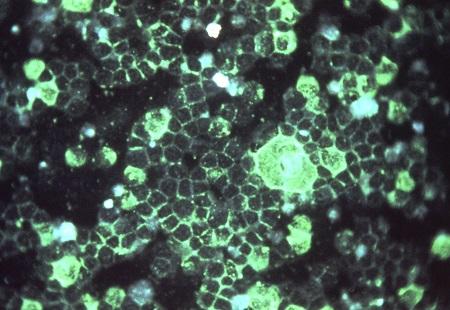Pfizer has agreed to acquire ReViral, a developer of antiviral therapeutics targeting respiratory syncytial virus (RSV), for up to $525 million, the companies said today, in a deal designed to meet the unmet need for RSV treatments by adding ReViral’s infectious disease pipeline and R&D capabilities to those of the buyer.
ReViral—which has operations in both London and Durham, NC—has developed an RSV-focused pipeline led by sisunatovir (formerly RV521), an oral antiviral inhibitor of the RSV-F fusion protein that is under study for RSV in infants in the global Phase II REVIRAL1 trial (NCT04225897).
“This acquisition represents a validation of the deep antiviral experience of the ReViral team and our unwavering commitment to deliver therapies for patients in need,” ReViral CEO Alex C. Sapir said in a statement.
Last year, ReViral said it completed part A of the three-part REVIRAL1, designed to evaluate the safety, tolerability, pharmacokinetic (PK) profile, antiviral effects, and clinical effect of single and multiple oral doses of sisunatovir in otherwise healthy infants between the ages of one and 36 months hospitalized with RSV lower respiratory tract infections.
As a result of completing what it termed a “watershed moment,” ReViral said it was able to advance REVIRAL1 to Part B, the double-blind, placebo-controlled stage of the study where patients have been receiving drug or placebo twice a day for five days.
In 2020, a research team published data in the journal Antimicrobial Agents and Chemotherapy from a human proof-of-concept study (NCT03258502) showing sisunatovir to have effectively reduced RSV viral load and disease severity in humans, as well as to be well tolerated. The 350 mg dose reduced viral load 78.42%, while the 200 mg dose showed a reduction of 70.84%.
Michael Yee, an analyst with Jefferies, noted additional data from the study showing that sisunatovir also significantly reduced symptom scores by more than 70% and nasal mucus weight by about 85% at both doses.
“We presume PFE naturally has had some access to blinded analyses or interim analyses of the ongoing studies or enough data to determine early positive results or that the drug is ‘working’ and can continue to be enhanced through trial design for Phase III and/or other factors to generate future success.),” Yee wrote in a research note today.
Vote of confidence
Yee added: “This acquisition obviously speaks to some confidence PFE has in the ongoing Phase II RSV studies, and should increase investor confidence in the RSV program.”
The acquisition appeared to explain a 4.3% rise in Pfizer shares, which closed today at $55.16, up from yesterday’s closing price of $52.87.
Sisunatovir is also being evaluated in adults through the Phase II REVIRAL2 trial (NCT04267822). ReViral has partnered with LianBio to develop and commercialize sisunatovir in China, Hong Kong, Macau, and Singapore.
Also in ReViral’s pipeline is an RSV N-protein replication inhibitor program currently in Phase I study.
Pfizer projects it could generate an additional $1.5 billion or more from ReViral’s RSV programs is they prove successful enough to reach the market. The pharma giant finished last year with $81.3 billion, nearly double (up 95%) from a year earlier, driven by the $36.781 billion generated by its COVID-19 vaccine co-developed with BioNTech, COMIRNATY®.
“We’re continuing to grow our pipeline—through our own research-and-development efforts, such as our investigational RSV vaccine programs, as well as strategic investments in companies like ReViral—with a focus on end-to-end capabilities to help protect patients from severe illness, hospitalization, and death,” stated Pfizer Chairman and CEO Albert Bourla, DVM.
Pfizer is developing its own late-phase RSV vaccine candidate, PF-06928316 or RSVpreF, targeting prefusion F, a form of the viral fusion protein (F) that is used by RSV to attack human cells. In September, Pfizer launched the ongoing Phase III RENOIR trial (NCT05035212) evaluating the efficacy, immunogenicity, and safety of a single dose of RSVpreF, in adults ages 60 years or older.
Last month, PF-06928316 received the FDA’s Breakthrough Therapy Designation for the prevention of lower respiratory tract disease caused by RSV in individuals 60 years of age or older, based on positive results of a proof-of-concept, Phase IIa study evaluating the safety, immunogenicity, and efficacy of a single dose of 120µg RSVpreF in a human viral challenge model in healthy adults ages 18–50.
RSVpreF also received a separate Breakthrough Therapy Designation from the FDA in March for the prevention of RSV-associated lower respiratory tract disease in infants from birth up to six months of age by active immunization of pregnant women. That designation followed positive results of a Phase IIb proof-of-concept study of RSVpreF (NCT04032093), which assessed the safety, tolerability, and immunogenicity of RSVpreF in vaccinated pregnant women ages 18–49 and their infants. The FDA had granted Fast Track status to RSVpreF in 2018.
“The proposed acquisition of ReViral’s pipeline of therapeutic candidates is complementary to our efforts to advance the first vaccine candidate to help protect against this harmful disease,” stated Annaliesa Anderson, PhD, Senior Vice President and Chief Scientific Officer, Bacterial Vaccines and Hospital, at Pfizer. “Combining the capabilities and expertise of our organizations will enable us to further the clinical development of a potential therapy for those with RSV disease.”
Pfizer agreed to shell out up to $525 million for ReViral, without detailing in an announcement how much will be paid upfront, and how much will be tied to achieving milestones.
The acquisition deal is is subject to receipt of regulatory approvals and other customary closing conditions, with no projected closing date announced.
“Pfizer is an optimal partner given their commitment to RSV through their ongoing RSV vaccine program, coupled with their world-class clinical, regulatory, manufacturing and commercial capabilities,” Sapir added. “We look forward to working with our colleagues at Pfizer to bring these therapies to patients as quickly as possible.”

